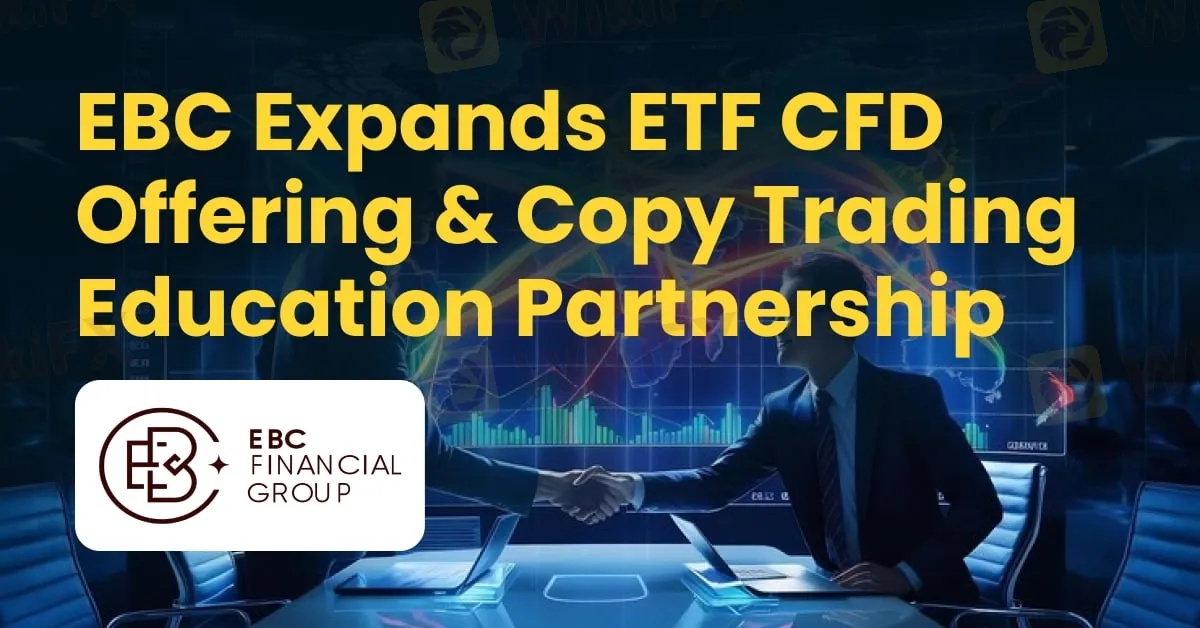简体中文
繁體中文
English
Pусский
日本語
ภาษาไทย
Tiếng Việt
Bahasa Indonesia
Español
हिन्दी
Filippiiniläinen
Français
Deutsch
Português
Türkçe
한국어
العربية
EBC Expands ETF CFD Offering & Copy Trading Education Partnership
Abstract:EBC Financial Group (EBC) has announced two major developments to support its trading clients worldwide. The firm has launched over 100 new U.S.-listed ETF Contracts for Difference (CFDs) and entered into a knowledge-sharing partnership with technology provider Brokeree Solutions.

EBC Financial Group has announced two major developments to support its trading clients worldwide. The firm has launched over 100 new U.S.-listed ETF Contracts for Difference (CFDs) and entered into a knowledge-sharing partnership with technology provider Brokeree Solutions.
These actions reflect EBCs aim to offer more trading choices while also helping traders improve their understanding of markets and tools.
EBC has expanded its product range by introducing over 100 CFD instruments linked to exchange-traded funds (ETFs) listed on U.S. markets. These include funds from well-known issuers such as Vanguard, iShares (BlackRock), and State Street Global Advisors.
The new CFDs cover a wide set of themes, including country-specific funds like the iShares MSCI Brazil ETF, sector-based funds like the Vanguard Health Care ETF, and commodity-related funds such as the United States Oil Fund LP. There are also options focused on fixed income, dividend stocks, and mid-cap equities.
These CFD products allow traders to gain exposure to different markets without owning the underlying assets. Traders can take long or short positions and use leverage to increase exposure with less capital. The CFDs also avoid traditional management fees, offering a more cost-efficient way to trade ETFs.
EBC said that these instruments can be used alone or alongside other products to build more detailed trading strategies. The addition reflects growing interest in thematic trading tools that align with global market trends.

Alongside the product expansion, EBC has entered into a knowledge partnership with Brokeree Solutions. The partnership focuses on copy trading, a method where traders can follow the strategies of other, more experienced traders.
Brokeree brings its social trading system to the partnership, which allows users to act as either a trader or a follower directly through their brokers platform. The system includes tools for managing risk, copying trades in proportion, and filtering signals based on asset types.
EBC will contribute by sharing its market knowledge and helping traders understand how to use copy trading as a learning tool. The partnership will produce monthly educational articles covering practical trading topics such as performance improvement and risk control. These will be published on digital channels and are aimed at a wide audience.
In addition, the two companies will run a quarterly webinar series. These sessions will cover key subjects in trading and will include input from both platform providers and users. The first webinar will focus on risk management.
The aim of the partnership is to make advanced tools and information more accessible, and to encourage knowledge-sharing between brokers, traders, and technology providers.

Disclaimer:
The views in this article only represent the author's personal views, and do not constitute investment advice on this platform. This platform does not guarantee the accuracy, completeness and timeliness of the information in the article, and will not be liable for any loss caused by the use of or reliance on the information in the article.
Read more

“Wins with $19,916 weekly profit on Exnova”? There is something you should know.
Recently, a post on social media caught the attention of many traders — a supposed trader from Thailand allegedly made $19,916 in weekly profits on a trading platform called Exnova. While the claim sounds impressive and may spark curiosity among aspiring investors, it’s crucial to approach such statements with caution and understand the real facts behind the platform.

Oil Prices Slide After Cease-Fire
Oil markets tumbled on renewed geopolitical signals and market anxieties as both Brent crude and West Texas Intermediate (WTI) futures plunged over 5% following a fragile cease-fire agreement between Iran and Israel and a surprising comment from the U.S. President regarding Chinese imports of Iranian oil.

A Guide to RBI Forex Rules in India
To ensure transparency, the Reserve Bank of India (RBI), which regulates the country’s foreign exchange market, places certain rules on buying and selling currencies and other transactions.

Can cryptocurrencies be regarded as mortgage collateral?
The U.S. Federal Housing Finance Agency (FHFA) has issued a directive to mortgage giants Fannie Mae and Freddie Mac to begin evaluating cryptocurrency holdings as part of mortgage risk assessment criteria.
WikiFX Broker
Latest News
FXTM: A Closer Look at Its Licences
Tiger Brokers Expands Hong Kong Operations to Tap Offshore Chinese Wealth
U.S. Treasury yields rise after Trump announces Israel-Iran ceasefire
Gold Prices Down in Early Hours of Spot Trading Today in India
Purple Trading Penalized €150,000 Over Compliance Failures in Cyprus
Asian chip stocks rise after Nvidia reclaims title of the world's most valuable company
Nvidia's comeback sparks a rally in Asian chip stocks
CNBC Daily Open: Despite all the uncertainty, the S&P 500 is flirting with record highs — strange times
PU Prime and AFA Announce Partnership at Madrid Event
The top private and public colleges for financial aid — 5 offer average scholarships of more than $50,000
Currency Calculator


